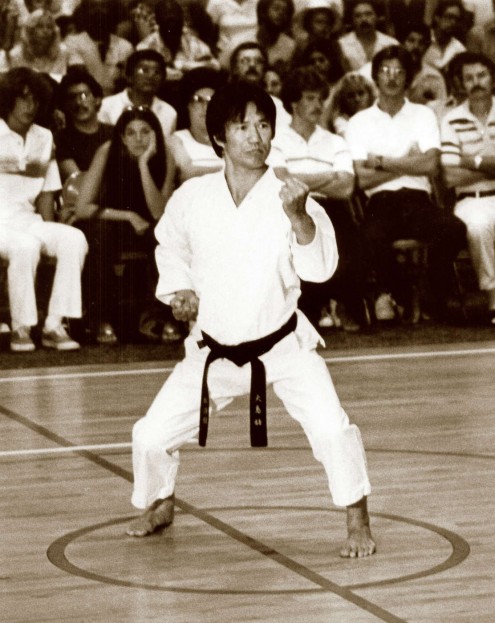This is a letter written by Tsutomu Ohshima to Reverend Mohri, the Chief Reverend of the Nishi-Hongwanji Temple in Los Angeles. It was written in January 1980, the seventh day of the Mr. Ohshima’s annual week-long fast.
I am writing this letter to you about fasting and a menu to follow immediately after fasting as I promised to do last month. This is the seventh day of my fast, which I break tomorrow morning. I have lost 20 pounds in the process, and feel great mentally, but physically like an old man.
Twenty-eight years ago, when I started to make fasts, I was motivated by arthritis, which caused a cessation of feeling in my right leg. I found out that fasting made me feel better, and my stomach and abdomen, which were previously weak, became stronger. Also, my mind felt much clearer after fasting. I am now fasting as an annual event, and if I don’t fast once a year, I feel that everything seems to go wrong.
A friend of mine in Japan, who was crazy about yoga, did a 31-day fast, but I was a young man who distrusted spiritualism and didn’t feel that I had to go to a high mountain top or a special dojo to fast. I fasted in my own room, and at first I was disturbed by the many smells of cooking in my house. Before beginning my first fast, I read four or five books on fasting, and I chose some common elements from each in order to avoid making any grave mistakes during my fast.
- Sick people, old people, small children and growing people, those with a temperature, flu, infection or skin disease should not fast.
- On the day preceding the fast, eat only good, digestible foods in small amounts. Some people use laxatives to clear the abdomen. Food you eat will stay in your intestine all through the period of fasting, so there should be no bad-quality food in the abdomen.
- During the fast, excessive movement should be avoided. Any twisting movement of the abdomen can be very dangerous. If you are careful when you stand up, sit down or lie down, there should be no problem.
- One must drink large quantities of good quality, natural (not distilled) water, at least one liter per day. If you find that after three to four days you can’t drink any more water because it is stuck in your throat, one drop of honey in your water should solve the problem. However, you must be careful not to mix anything else with water. Juice is not equal to water during a fast. If the mind weakens, the body must follow and nothing can stop it. If for example, the mind finds an excuse for drinking juice, it will rapidly weaken and the fast will be destroyed. If you introduce strong juices into an empty stomach, it can lead to bad results. The reason for this is that during a fast, all the fat and oil which usually accumulates on the inner lining of the stomach and protects it are removed by the fasting and acid may damage this lining.
- All movements must be done slowly. If you perform any sudden movements, you may feel faint, your legs may weaken and you might fall.
- For breaking the fast, great willpower is essential. If you eat large quantities immediately upon breaking your fast, you will destroy your physical condition and you will become mentally, psychologically and spiritually sick.
Included in this letter is my own personal menu for breaking a fast. Important points to remember are
- You must eat good foods.
- You must eat digestible foods.
- You must eat small amounts of food and gradually increase the quantity.
If you fast for five days, you should take five days to go back to normal foods and normal amounts.
During a fast, you might have headaches, dizziness, nausea, palpitations, skin rashes or cold hands and feet. These are common occurrences. If you develop a skin rash, this means that poisons are being released from the body, then the fast can be considered successful. But if the abdomen is suddenly painful and you break out in a cold sweat, you must consider a twisted abdomen. Call a physician immediately, and you must go to a hospital immediately for an operation. This seldom occurs, but it is a possibility. This is the exception of exceptions, but you must avoid dehydration and a twisted abdomen. If you are sure to drink at least one liter of water per day, and are careful of your movements, this will not happen.
I don’t want to lecture you, Reverend Mohri, but this is what I do during a fast – I sit [meditate], read and lie down. This practice of fasting will have a tremendous effect on your stomach and abdomen.
Sincerely, my best regards to your family,
Tsutomu Ohshima
Menu for Breaking Fast
1st Day
- Breakfast: One cup of very thin vegetable soup with a very small amount of salt. This soup is composed of potato, carrots and onions, ground up and well cooked.
- Lunch: One cup of thin rice soup with a small amount of dry bonito powder.
- Dinner: One cup of soft rice soup with scraped dry bonito and two to three pieces of nori [seaweed].
2nd Day
- Breakfast: Natural yogurt, one piece of toast without butter and one cup of soup.
- Lunch: Oatmeal with milk and honey and a little bit thicker soup.
- Dinner: Rice soup with 1’/2 cups of tofu with dry bonito and fresh applesauce.
3rd Day
- Breakfast: Two pieces of toast, one soft-boiled egg, small glass of milk or orange juice
- Lunch: A small amount of plain noodles.
- Dinner: Rice soup, two pieces of nori, tofu and a small amount of broiled fish.
4th Day
- Breakfast: Oatmeal with milk and honey, two pieces of toast, one soft-boiled egg, tea with honey.
- Lunch: One bowl of noodles with one egg, one banana
- Dinner: Soft rice, 1 Y2 cup miso soup with tofu, small amount of fish with soy sauce and cooked vegetables.
5th Day
- Breakfast: Two pieces of toast, one soft-boiled egg, one banana and tea with honey.
- Lunch: Tuna sandwich, vegetable soup, juice.
- Dinner: Ordinary food, but one half of normal volume, with no meat or fried food.
6th Day
- Breakfast: One large glass of various fruit juices, mixed together in blender, two pieces of toast and tea.
- Lunch: Ordinary food, one-half of normal volume without meat or oil.
- Dinner: 70 percent of ordinary meal.
7th Day
- Breakfast: Very easily digested, ordinary breakfast, slightly less than normal amounts.
- Lunch: Ordinary foods, no meat or oils.
- Dinner: Ordinary foods, slightly less than normal amounts, but no oil, meats or hard to digest foods.
After this, resume a normal diet.

